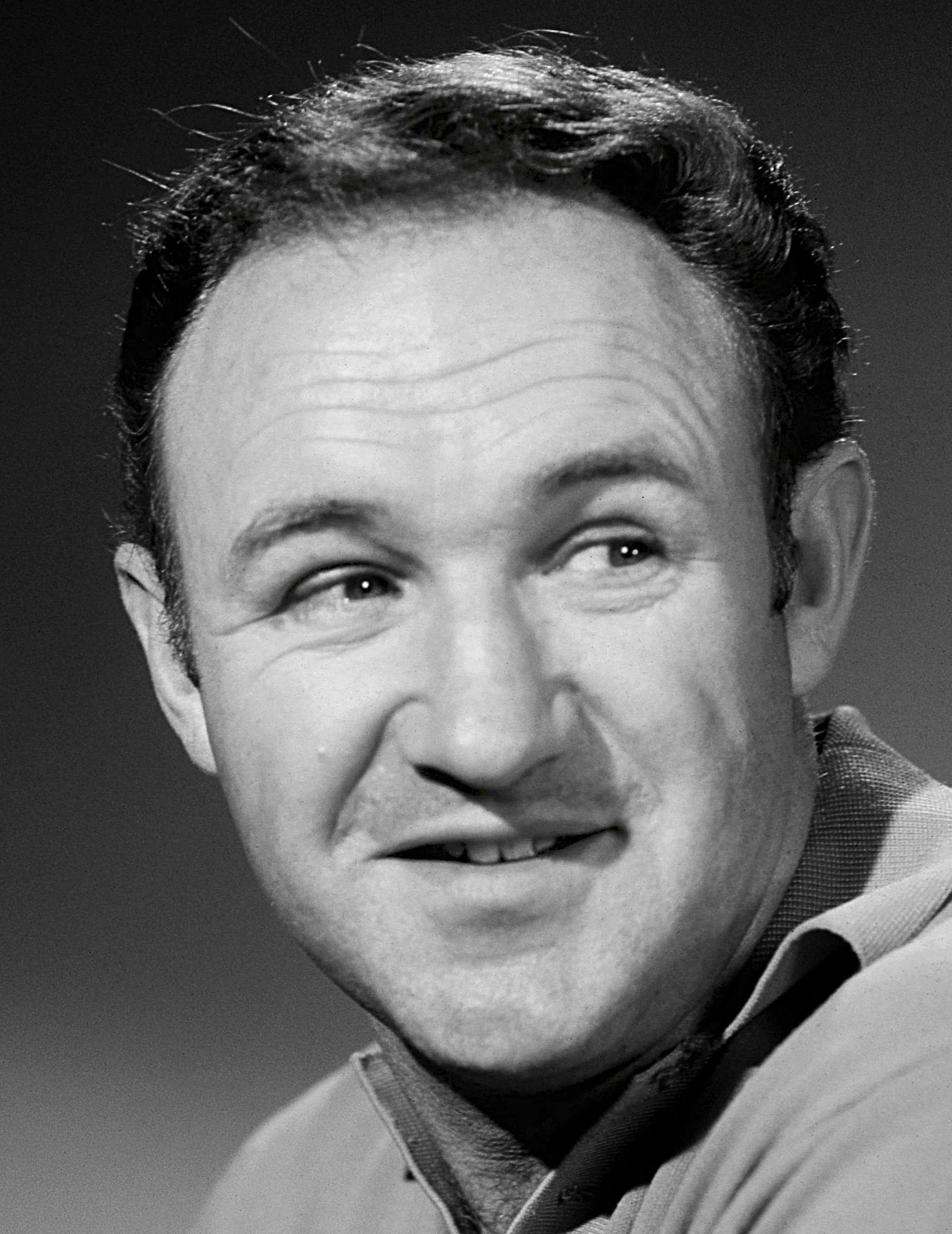GENE HACKMAN
(30 January 1930 - circa 18 February 2025)
When Gene Hackman died at the age of 95 it was in mysterious rather than suspicious circumstances. His death and that of his second wife, the pianist Betsy Arakawa and one of their dogs, was discovered by maintenance men a week after the incident. Apparently his wife died of hantavirus pulmonary syndrome from exposure to infected rodents, while the actor passed away from natural causes, heart disease brought on by Alzheimer’s. It is thought that Arakawa died a week before her husband who may have been unaware of her death. It is estimated that he died around 17 or 18 February.
Without any argument it is true to say that Gene Hackman was one of the Hollywood Greats. He turned in memorable performances with more than a hundred appearances over forty years. He was born Eugene Allen Hackman in San Bernardino, California, to Anna Gray and her husband Eugene Hackman. After moving around the country, the family, with sons Gene and Richard, settled in Danville, Illinois, where their father was a newspaperman. Gene wanted to act from the age of ten. He attended Storm Lake High School and joined the US Marine Corps at sixteen. As a civilian he moved to New York to study journalism and TV production, but went back to California, where he shared apartments with Dustin Hoffman and Robert Duvall.
Working at the Pasadena Playhouse, Hackman had faith in his own talent and was determined to succeed. In the early ‘60s he began to get bit parts in films and on TV, in series such as Route 66, Naked City, The Defenders, East Side/West Side etc. He also acted off-Broadway and, after a few duds, appeared with the Tony award-winning Sandy Dennis in Muriel Resnick’s comedy Any Wednesday, which was later filmed with Jane Fonda and Jason Robards. After that he appeared in Robert Rossen’s film of Lilith with Jean Seberg and Warren Beatty, followed by some stage work and more TV. In 1967 he was cast in The Graduate as Mr Robinson but director Mike Nichols thought he looked too young, so enter Murray Hamilton. The same year (1967) he was cast as Buck Barrow, the older brother of gangster Clyde Barrow (Warren Beatty), in Arthur Penn’s Bonnie and Clyde, and Hackman got an Academy Award nomination for it. More stage work and TV led to his playing a ski coach in Michael Ritchie’s Downhill Racer (1969) with Robert Redford, an astronaut in John Sturges’ Marooned with Gregory Peck, and a skydiver in John Frankenheimer’s The Gypsy Moths with Burt Lancaster. Hackman was never far from working with the best actors and actresses in highly prestigious box-office successes – there were three Superman films, having fun as Lex Luthor, The Poseidon Adventure, Hoosiers, A Bridge Too Far, The Firm and The Birdcage among many other titles. He liked working with Al Pacino on Scarecrow in which two bums try to start up a business in Pittsburgh. Hackman was so good in so many excellent films that it is hard to decide what he will be remembered for. I Never Sang for My Father (1970) showed the gulf between a son and his aging father and the guilt he feels when he moves to California after his mother’s death. It’s a poignant piece that opens up old family sores, acted supremely well by Hackman with Melvyn Douglas as the father. Hackman was again nominated for an Oscar.
The French Connection (1971) saw him as Jimmy ‘Popeye’ Doyle in pursuit of a heroin-smuggling gang. Director William Friedkin pumped up the action with great chase scenes and the film won five of its eight Oscar nominations, including a best actor win for Hackman. The sequel was even better under John Frankenheimer’s direction. Between those two thrillers a film with a high suspense factor was Francis Ford Coppola’s The Conversation, in which Hackman played a surveillance expert who listens in to phone calls and then records them as evidence of malfeasance, but when some of his ‘calls’ show evidence of a murder, the tables are turned on him. In this film and in many others, Hackman played a hard nut, but he was also good at comedy, witness his appearance as Harold the blind man in Mel Brooks’ Young Frankenstein. He was in Woody Allen’s Another Woman, perhaps for a change, but then he was back to searing drama in Mississippi Burning in which he played one of two FBI agents looking for three missing civil rights workers in a background of the Ku Klux Klan. Hackman was Oscar-nominated and the cinematographer, Peter Biziou, won the award. In Unforgiven Clint Eastwood cast him as an old cowboy in this revisionist western, the last of the director’s signature movies for which both Eastwood and Hackman won Oscars. In Absolute Power Hackman was a US President involved in hushing up his own misdemeanours (sound familiar?). Eastwood directed and also played a criminal witness in this enthralling piece of political drama. One of Hackman’s best and last film roles was that of the eccentric father in Wes Anderson’s The Royal Tenenbaums where he leaves his children, returning only after they have grown up, when he claims that he’s dying.
Hackman and his wife lived away from Hollywood in Santa Fe, New Mexico, leading a quiet life after Hackman retired in 2008. He was also an author who had written historical novels and some non-fiction. Before he married pianist Betsy Arakawa in 1991, he was earlier married to Filipa Maltese from 1956 to 1986. Before they divorced, they had three children, Christopher, Elizabeth Jean and Leslie Anne all of whom survive their father’s death.
MICHAEL DARVELL

